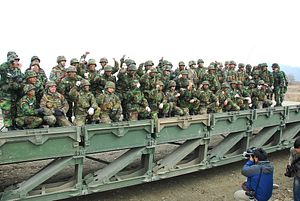South Korea and the United States will enter talks for a new so-called Special Measures Agreement (SMA) on cost-sharing for the U.S. force presence on the Korean Peninsula.
The agreement will be the 10th of its kind and will enter into force in 2019 once fully negotiated. The South Korean Foreign Ministry announced that the talks would take place this week in Hawaii, from Wednesday to Friday. Each SMA lasts for a duration of five years, with the last having entered into force in 2014.
“The delegations from the two sides will be trying to reach an agreement that helps strengthen the South Korean-U.S. alliance and joint defense readiness,” the foreign ministry said. “Our government will try to produce reasonable results that can be accepted by our people.”
The U.S. State Department released a statement noting that “Since 1991, the ROK has helped offset the costs of stationing U.S. forces through the SMA mechanism.”
According to the United State’s accounting, “Under the current five-year SMA that expires on December 31, 2018, the ROK provided approximately $830 million per year.”
The State Department added that “both delegations are committed to developing an agreement that strengthens the U.S.-ROK Alliance and that ensures the security of the ROK and its people.”
The United States will be represented by Senior Advisor for Security Negotiations and Agreements Timothy Betts from the State Department’s Bureau of Political-Military Affairs while the South Korean delegation will be led by Chang Won-sam, special representative for SMA consultations.
Around 28,500 U.S. troops are stationed in South Korea and under the terms of the ninth SMA, the South Korean government paid for roughly half of the costs of their presence.
Nevertheless, cost-sharing with allies became a hot-button issue for U.S. President Donald Trump during his campaign for the presidency. Though it has been less of an emphasis for Trump while in office, the next round of SMA talks could be especially difficult given the overhang of previous criticism by the U.S. president.
During Trump’s November trip to South Korea, Moon emphasized South Korea’s contribution to a major U.S. Forces Korea project — the construction of Camp Humphreys — by emphasizing that South Korea had paid for as much as 92 percent of the construction costs.
The SMA talks will occur at a sensitive time for the alliance. The United States and South Korea are set to commence their annual springtime joint exercises — Foal Eagle and Key Resolve — in a few weeks.
In the meantime, Washington and Seoul have diverged on managing North Korea; South Korean President Moon Jae-in has reciprocated North Korean leader Kim Jong-un’s rapprochement, which was announced in his new year’s address in Pyongyang, while the United States continues to hew to its “maximum pressure” approach toward North Korea.

































